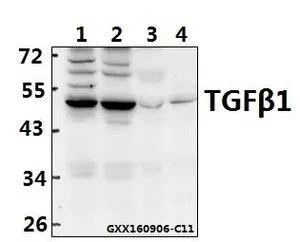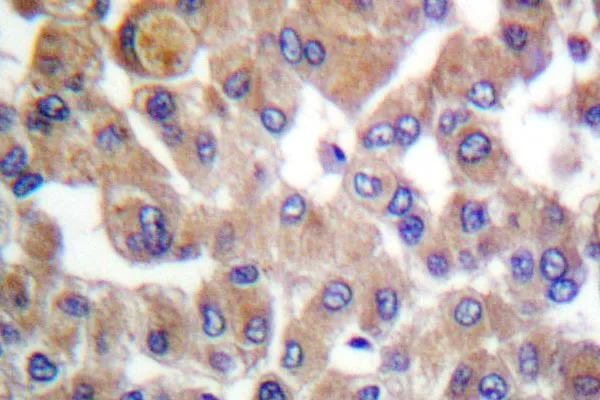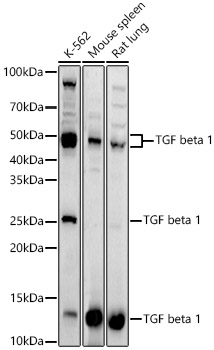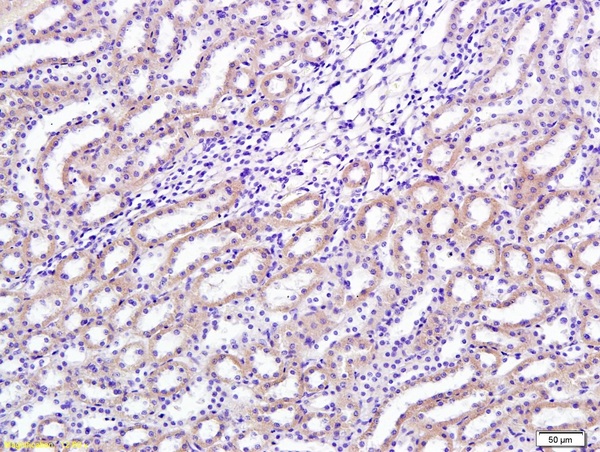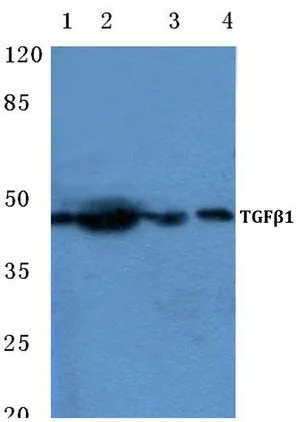
WB analysis of various samples using GTX66628 TGF beta 1 antibody. Lane1 : HeLa cell lysate Lane2 : SP2/0 cell lysate Lane3 : H9C2 cell lysate Lane4 : MCF-7 cell lysate Dilution : 1:500
TGF beta 1 antibody
GTX66628
ApplicationsWestern Blot, ImmunoHistoChemistry, ImmunoHistoChemistry Paraffin
Product group Antibodies
ReactivityHuman, Mouse, Rat
TargetTGFB1
Overview
- SupplierGeneTex
- Product NameTGF beta 1 antibody
- Delivery Days Customer9
- Application Supplier NoteWB: 1:500-1:1000. IHC-P: 1:50-1:200. *Optimal dilutions/concentrations should be determined by the researcher.Not tested in other applications.
- ApplicationsWestern Blot, ImmunoHistoChemistry, ImmunoHistoChemistry Paraffin
- CertificationResearch Use Only
- ClonalityPolyclonal
- Concentration1 mg/ml
- ConjugateUnconjugated
- Gene ID7040
- Target nameTGFB1
- Target descriptiontransforming growth factor beta 1
- Target synonymsCED, DPD1, IBDIMDE, LAP, TGF-beta1, TGFB, TGFbeta, transforming growth factor beta-1 proprotein, TGF-beta-1, latency-associated peptide, prepro-transforming growth factor beta-1, transforming growth factor beta1
- HostRabbit
- IsotypeIgG
- Protein IDP01137
- Protein NameTransforming growth factor beta-1 proprotein
- Scientific DescriptionThis gene encodes a secreted ligand of the TGF-beta (transforming growth factor-beta) superfamily of proteins. Ligands of this family bind various TGF-beta receptors leading to recruitment and activation of SMAD family transcription factors that regulate gene expression. The encoded preproprotein is proteolytically processed to generate a latency-associated peptide (LAP) and a mature peptide, and is found in either a latent form composed of a mature peptide homodimer, a LAP homodimer, and a latent TGF-beta binding protein, or in an active form consisting solely of the mature peptide homodimer. The mature peptide may also form heterodimers with other TGFB family members. This encoded protein regulates cell proliferation, differentiation and growth, and can modulate expression and activation of other growth factors including interferon gamma and tumor necrosis factor alpha. This gene is frequently upregulated in tumor cells, and mutations in this gene result in Camurati-Engelmann disease. [provided by RefSeq, Aug 2016]
- ReactivityHuman, Mouse, Rat
- Storage Instruction-20°C or -80°C,2°C to 8°C
- UNSPSC41116161

